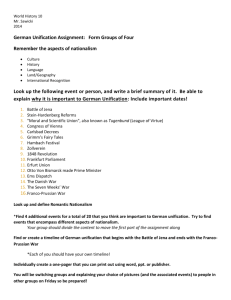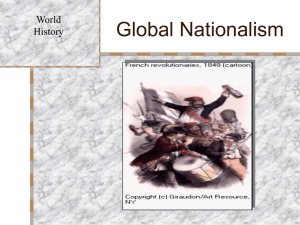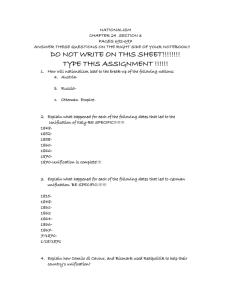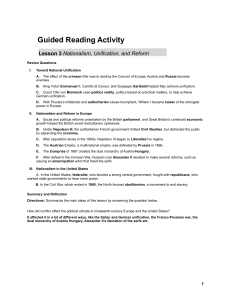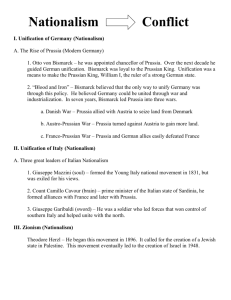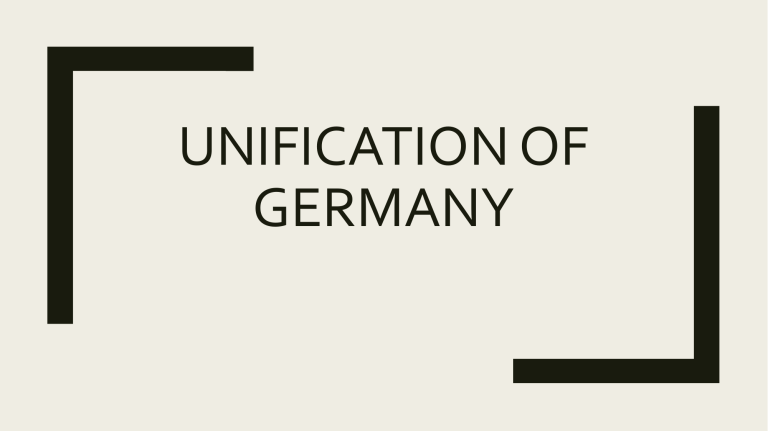
UNIFICATION OF GERMANY Table of Contents - Summary - Cultural Context - Economic Context - Geopolitical Context - Course and Outcome Summary The Unification of Germany is a series of political, diplomatic, and military actions lasting from 1840~1871 that saw Prussia lead the formation and unification of many Germanic states under the newly founded nation – the German Empire. CULTURAL CONTEXT Does the culture of people define the nation, or does the nation define its culture? In what situations is cultural change accepted and justified? Origins ■ Early tribes that settled along the Rhine and Danube may have originated from Scandinavia. ■ A Germanic tribe named Cherusci was able to defeat a sizable Roman army, forcing the Roman Empire to consolidate its borders along the Rhine River Origins ■ After the fall of the Western Roman Empire in the 5th century, what followed was the Frankish Empire ■ After King Charlemagne’s death in the 9th century, the emperor was partitioned into three. Origins ■ From the 10th century to the 16th century, the Holy Roman Empire expanded eastward. ■ The major effect of the HRE in terms of culture is that it established a common language. Napoleonic Wars ■ Napoleon’s victory over the HRE separated states once again into individual German states. ■ After Napoleon’s defeat, nationalism was instead limited due to fears of revolution. The Issue of National Culture ■ A strict national culture has not been built during the unification process, and was left to be completed after. Examples of policies include: The Kulturkampf The Borossian Myth ECONOMIC CONTEXT How impactful is economics in determining the policies of states? Is the economic development more effective than armed conflict? Geography – Trade in the North Sea ■ Trade within Germany is often overlooked due to its semi-landlocked position. ■ The Hanseatic League would dominate the trade in the Baltic sea from its formation in the 11th century, up until the 15th century The Industrial Revolution ■ German railway were left in horrible conditions due to ongoing wars. ■ Reinvigoration of the railway system brough great economic benefits and cultural cohesion to the German people. Economics and Trade – The Zollverein and Custom Unions ■ The Zollverein is a customs union formed and led by Prussia, later the German Empire, from 1818 to 1919 ■ Goods can now be transferred across German states without taxes or tariffs, increasing Prussian influence. GEOPOLITICAL CONTEXT How can a state emerge victorious in a struggle for power? What is the link between the rise of nationalism and the creation of nation-states? French Hegemony – The Dissolution of the HRE ■ Under Napoleon’s rule, the French were able to defeat and finally dissolve the long-lasting Holy Roman Empire on 1806. ■ Power vacuum soon filled by the Confederation of the Rhine The Congress of Vienna ■ The Congress of Vienna that followed Napoleon’s defeat split Europe into “spheres of influences.” ■ The two plans of reunification – Greater Germany and Lesser Germany Liberalism ■ Liberalism thought led to widespread nationalist sentiments in the public. ■ Moreover, the economic problems during the mid 19th century fueled public unrest. Realpolitik ■ Three important Prussian individuals pushed policies and reforms after gaining position in the 1850s and 60s. ■ The emergence of Prussian Realpolitik after a shift in balance of power in the late 1850s. COURSE & OUTCOME Can wars fought in the name of unification and independence be justified? Is unification determined by ‘great people’ or by the ‘trend’? Does unification always lead to the rise of nationalism? The 1848 Revolutions ■ The 1848 Revolutions were a series of political revolutions in Europe inspired by liberal, democratic values. ■ The German 1848 Revolutions heavily favored nationalism and called for unification of the German states under one banner. The 1848 Revolutions in Prussia ■ In Prussia, protesters demanded for Prussia to lead the unification of Germany. ■ This lead to the Creation of the Frankfurt Assembly The Iron Chancellor – Otto von Bismarck ■ A master strategist and politician born into a Junker family. ■ Mastermind behind Unification of Germany ■ Appointed as envoy to the Diet of the German Confederation, as ambassador to Russia and France. The Prussian Army – Roon and Moltke ■ Albrecht von Roon and Helmuth von Moltke were key figures in the Prussian army. ■ Roon carried out army reforms as the Minister of War. ■ Moltke was the commander of the army during later wars. The King – Wilhelm I ■ King Wilhelm I ruled as King of Prussia and later as Emperor of Germany from 1861-1888. ■ One of the first conflict he had to handle caused him to appoint Bismarck. The SchleswigHolstein Question ■ Conflict between Denmark and the German Confederation. ■ Decisive victory for the German Confederation, and Prussia was able to further exploit the peace treaty to gain initiative in politics. The Austro-Prussian War ■ Provoked Austria to start war in order to prevent coalitions from major powers to accuse and invade Prussia. ■ Diplomatic negotiations and clever timing were crucial to prevent coalitions from forming. ■ Limited warfare was once again used after a strategic goal was secured. The FrancoPrussian War ■ With the Austrians out of the picture, Bismarck was able to further construct the interdependency of the remaining states through treaties. ■ The Succession Dispute of Spain offered a chance to provoke the French into attacking Prussia. The Franco-Prussian War ■ French military was no match against the Operational success directed by von Roon and the Strategic success directed by Moltke ■ The defeat of France was the last piece of the puzzle in unifying Germany. Victory and Unification ■ Victory in the Franco-Prussian war reinvigorated and bolstered panGermanism and nationalism, the difference now being that Prussia was the sole leader.
